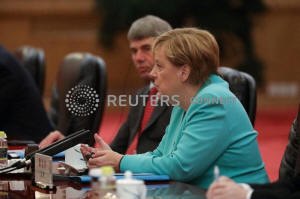Merkel hopes China-U.S. trade problems will be over soon
 Send a link to a friend
Send a link to a friend
 [September 06, 2019] By
Andreas Rinke [September 06, 2019] By
Andreas Rinke
BEIJING (Reuters) - German Chancellor
Angela Merkel said at the start of a visit to Beijing on Friday that the
China-U.S. trade war was affecting the whole world and she hoped it
would be resolved soon.
Germany's firms have been caught in the crossfire of a U.S.-China trade
conflict, its economy - Europe's largest - contracted on weaker exports
in the second quarter, and leading economists say it is facing a
recession, especially after weak industrial data published this week.
But while U.S. President Donald Trump has pressed American companies to
look at ways to close their Chinese operations and make more of their
products at home, Merkel wants to start a new phase in the European
Union's relations with China.
"We hope that there will be a solution in the trade dispute with the
United States since it affects everybody" in the world, Merkel told
Chinese Premier Li Keqiang at Beijing's Great Hall of the People during
a two-day trip to China.
China and the United States are due to resume trade talks this month,
with more senior consultations next month in Washington.

Merkel has pushed for a European investment deal with Beijing, even as
Washington has resorted to waves of tariffs to counter what it says are
China's unfair trade practices. The United States' European allies,
including Germany, largely share its criticisms of China, but not
Trump's choice of tariffs to resolve the issues.
Merkel said Germany is open for Chinese investment and she welcomes all
Chinese companies to invest in the country. However, she added that
Germany checks investments in certain strategic sectors and critical
infrastructure.
Li said that China hopes Germany will accept more Chinese companies and
loosen export rules for certain goods.

[to top of second column] |

German Chancellor
Angela Merkel speaks to Chinese Premier Li Keqiang (not pictured)
during their meeting at the Great Hall Of The People in Beijing,
China September 6, 2019. Andrea Verdelli/Pool via REUTERS

Germany, which traded almost 100 billion euros ($111 billion) in goods with
China in the first half of 2019, holds the rotating EU presidency in 2020, when
Merkel is planning an EU-China summit with a view to achieving a common European
stance toward the world's second-largest economy.
Referring to an EU-China investment agreement, Merkel said that Germany was
hoping "that we can perhaps finish this project" during its EU presidency in the
second half of next year.
That summit would aim to counter what Berlin sees as China's divide-and-rule
approach to dealing with the European bloc, as Beijing promotes global
infrastructure projects under its Belt and Road development initiative that has
made it an influential player in poorer eastern EU countries, such as Hungary
and Greece.
Several companies signed agreements as Merkel and Li met, including Airbus <AIR.PA>
- which came to an arrangement with China's AVIC Aircraft Corporation on
assembling A320 planes in China - and German insurer Allianz <ALVG.DE>, which
wants to work more closely with the Bank of China.
German engineering group Voith [VOITH.UL] and CRRC said they wanted to cooperate
on electric buses and Siemens signed a memorandum of understanding with China's
State Power Investment Corporation Limited (SPIC) on developing gas turbines and
cooperating on the use of hydrogen.

Ahead of her departure for China, prominent Hong Kong activists wrote to the
chancellor urging her to be guided by her memories of life in dictatorial East
Germany, and to be on her guard in her talks and business dealings with Beijing.
Hong Kong leader Carrie Lam on Wednesday withdrew an extradition bill that
triggered months of often violent protests in the Chinese-ruled city, but some
protesters said the move was not enough.
(Reporting by Andreas Rinke; Writing by Michael Martina and Ben Blanchard in
Beijing and Michelle Martin in Berlin; Editing by Jacqueline Wong and Michael
Perry, William Maclean)
[© 2019 Thomson Reuters. All rights
reserved.] Copyright 2019 Reuters. All rights reserved. This material may not be published,
broadcast, rewritten or redistributed.
Thompson Reuters is solely responsible for this content. |